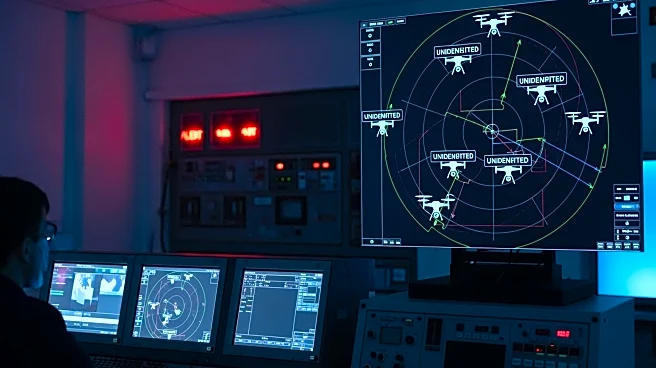What's Happening?
NATO allies are facing internal disagreements over how to respond to recent Russian drone incursions into their airspace. The issue has sparked debate among member nations, with some advocating for a more aggressive stance, including shooting down Russian drones,
while others prefer a more cautious approach. This division was highlighted during a recent meeting of alliance defense ministers in Brussels, where differing opinions on handling Russian provocations were evident. The incursions, which include Russian drones entering Polish airspace and fighter jets crossing into Estonia, have prompted discussions on the appropriate level of military response. Some NATO members, like Poland, have taken decisive action by shooting down drones, whereas others, such as Estonia, have opted for less confrontational measures. The lack of a unified NATO policy on such incursions has led to varied responses, reflecting the diverse strategic priorities and risk assessments of member states.
Why It's Important?
The ongoing debate within NATO over how to handle Russian incursions is significant as it highlights the challenges of maintaining alliance cohesion in the face of external threats. The differing responses among member nations could potentially weaken the alliance's collective security posture, which is crucial for deterring further Russian aggression. The situation underscores the strategic importance of NATO's eastern flank, where countries like Poland and the Baltic states are on the front lines of potential conflict with Russia. The outcome of these discussions could influence NATO's future defense strategies and its ability to present a united front. Additionally, the debate reflects broader geopolitical tensions and the need for NATO to adapt to evolving security threats, including the use of unmanned aerial vehicles in modern warfare.
What's Next?
As NATO continues to grapple with the appropriate response to Russian provocations, further discussions and consultations among member states are expected. The alliance may work towards developing a more standardized policy for dealing with such incursions to ensure a coordinated response. Additionally, the situation may prompt NATO to enhance its air defense capabilities and invest in counter-drone technologies. The outcome of these deliberations could also impact NATO's relationship with Russia and its overall strategic posture in Europe. Member states will likely continue to assess the balance between deterrence and escalation, aiming to prevent further destabilization in the region.
Beyond the Headlines
The internal disagreements within NATO over handling Russian incursions may have deeper implications for the alliance's long-term cohesion and effectiveness. The situation highlights the complexities of collective defense in a diverse alliance with varying threat perceptions and military capabilities. It also raises questions about the future of transatlantic relations, particularly in light of shifting U.S. defense priorities. The debate may prompt NATO to reevaluate its strategic objectives and consider reforms to enhance its decision-making processes and operational readiness. Furthermore, the situation underscores the importance of diplomatic efforts to manage tensions with Russia and prevent further escalation.
















